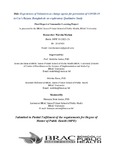| dc.contributor.advisor | Sarker, Malabika | |
| dc.contributor.advisor | Barua, Mrittika | |
| dc.contributor.author | Mariam, Warisha | |
| dc.date.accessioned | 2023-07-24T06:04:57Z | |
| dc.date.available | 2023-07-24T06:04:57Z | |
| dc.date.copyright | 2023 | |
| dc.date.issued | 2023 | |
| dc.identifier.other | ID 22167028 | |
| dc.identifier.uri | http://hdl.handle.net/10361/18977 | |
| dc.description | This project report is submitted in partial fulfillment of the requirements for the degree of Master of Public Health (MPH), 2023. | en_US |
| dc.description | Cataloged from the PDF version of the project report. | |
| dc.description | Includes bibliographical references (pages 23-26). | |
| dc.description.abstract | Background: Community volunteers are an important backbone for engaging communities
to bring about health related behaviour change among the people of the communities. In
recent years the pandemic due to Coronavirus 2019 has gained all the momentum and most of
the preventive strategies have been shifted in reducing the further transmission of this virus
and curbing the pandemic. This study examines the volunteering experience of the volunteers
working in the BRAC Community Support Team intervention as change agents in the Cox
Bazaar community. The area has been chosen for its high urban and peri urban type of
population density.
Methods: This was an exploratory qualitative study done among ten volunteers involved in
BRAC CST project in Ramu, Sadar and Kutubdia upazilas of Cox’s Bazaar. In depth
interviews were conducted and data was organised, coded and analysed using manual coding
and web-based software Dedoose. Thematic analysis has been done and results has been
interpreted using the Social Cognitive Theory.
Results: Ten volunteers were interviewed, out of which 1 is female and 9 males. The age
ranges from 21 to 38 years. All volunteers perceived their desire to work as a volunteer a
noble cause for the community. They were also recognised and respected in the society for
their work done. Social recognition, job satisfaction for working in public welfare and
support from their families and communities helped them to perform their job better.
However, social, cultural and language barrier and shaming of their work by abusing and
harassing played an important role in hindrance to performing their activities as change
agents. There were also some power distribution roles in community which hampered the
volunteering activity. Lack of refresher training and limited resources and absence of
mobility support are some of the identified factors that also hampered their activity as a
change agent.
Conclusion: In general volunteers were able to perform their assigned tasks. However,
ensuring continuous organisational support, refresher trainings can lead to a greater
motivation for acting as a change agent and performing their tasks better. Future research
directed towards exploring the gender differences in experiences will also add to the
knowledge gap. | en_US |
| dc.description.statementofresponsibility | Warisha Mariam | |
| dc.format.extent | 39 pages | |
| dc.language.iso | en | en_US |
| dc.publisher | Brac University | en_US |
| dc.rights | Brac University project reports are protected by copyright. They may be viewed from this source for any purpose, but reproduction or distribution in any format is prohibited without written permission. | |
| dc.subject | Community volunteers | en_US |
| dc.subject | BRAC | en_US |
| dc.subject | CST | en_US |
| dc.subject | Covid-19 | en_US |
| dc.subject | Cox’s Bazar | en_US |
| dc.subject.lcsh | Covid -19 (Disease) | |
| dc.subject.lcsh | Covid-19-- Prevention | |
| dc.title | Experiences of volunteers as change agents for prevention of COVID-19 in Cox’s Bazaar, Bangladesh: an exploratory qualitative study | en_US |
| dc.type | Project report | en_US |
| dc.contributor.department | James P Grant School of Public Health, Brac University | |
| dc.description.degree | M. Public Health | |

